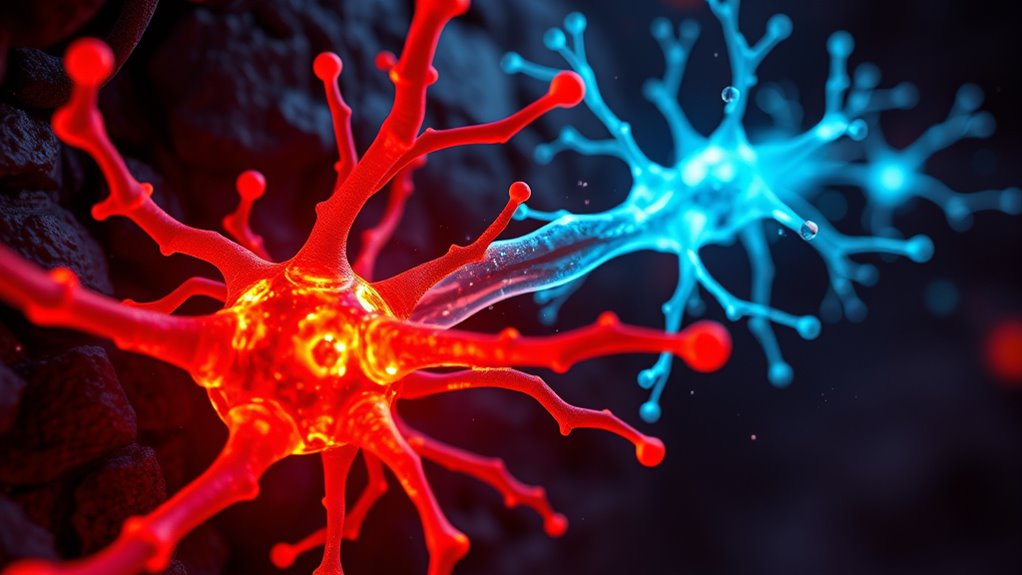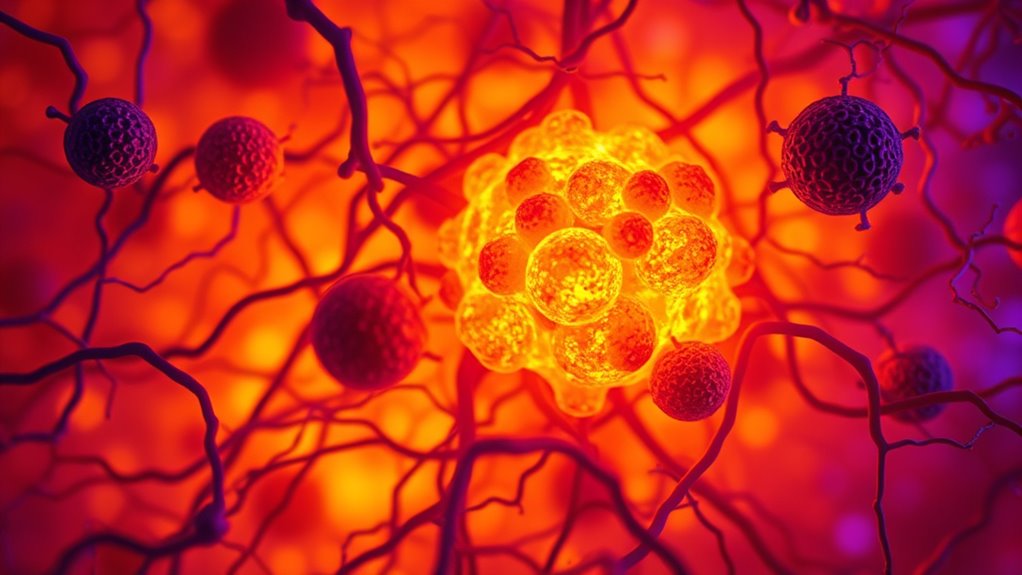Inflammation, especially chronic low-grade inflammation called inflammaging, plays a key role in aging. It damages cells, tissues, and DNA, accelerating health decline and increasing risks for diseases like Alzheimer’s and heart issues. As you age, your immune system changes and accumulates senescent cells that secrete harmful signals, fueling inflammation. Understanding these processes can help you learn how to support healthy aging—continue to explore these concepts to discover strategies to combat inflammaging.
Key Takeaways
- Chronic, low-grade inflammation, called inflammaging, accelerates cellular damage and tissue decline associated with aging.
- Key molecules like NF-kB and cytokines drive inflammatory pathways impacting multiple body systems.
- Inflammaging promotes cellular senescence, mitochondrial dysfunction, and immune system deterioration, worsening age-related diseases.
- Emerging research focuses on biomarkers, molecular pathways, and therapies such as senolytics to modulate inflammation for healthier aging.
- Lifestyle changes like diet, exercise, and stress management can reduce inflammation, supporting improved healthspan in older adults.
The Connection Between Aging and Inflammation

As you age, your immune system undergoes persistent activation, leading to a state known as “inflammaging.” This low-grade, chronic inflammation occurs even without infection and results from various cellular and molecular changes. You’ll notice increased levels of inflammatory markers circulating in your blood, reflecting heightened immune activity. Macrophages become more prone to chronic inflammation and respond excessively when challenged. Additionally, senescent cells release pro-inflammatory cytokines, fueling the inflammatory environment. Mitochondrial dysfunction produces reactive oxygen species (ROS), which activate inflammasomes, further boosting inflammation. Your immune regulation weakens with age, impairing the control of inflammatory responses. This persistent, low-level inflammation damages tissues, accelerates aging, and raises your risk for age-related diseases like heart disease and neurodegeneration.
Key Molecules and Pathways in the Inflammatory Response

Understanding the key molecules and pathways involved in the inflammatory response is essential to grasp how your body defends itself against harm. When infection or tissue damage occurs, cells like mast cells and macrophages detect danger signals, releasing molecules such as cytokines and chemokines (e.g., TNF-alpha, CXCL8). These signaling proteins activate pathways like NF-kB and AP-1, which drive the expression of inflammatory genes. Toll-like receptors (TLRs) recognize toxins and pathogens, triggering MAPK and p38MAPK pathways that amplify inflammation. Key transcription factors like NF-kB and c-Jun coordinate gene activation. Molecules like histamine cause blood vessel dilation, while leukotrienes and C5a recruit immune cells. Targeting molecules like PKCδ-MAL interactions offers promising strategies to modulate inflammation effectively. Understanding inflammation involves recognizing how these molecules and pathways work together to protect the body.
How Inflammation Accelerates the Aging Process

When inflammation persists, it damages your cells and tissues, speeding up the aging process. This ongoing damage activates cellular senescence, causing your cells to stop dividing and release harmful signals. Over time, this combination harms your DNA and tissues, making you age faster and increasing your risk for age-related diseases. Proper management of inflammation can help mitigate these effects and support healthier aging through effective strategies. Recognizing the role of self-care techniques can be essential in reducing chronic inflammation and promoting longevity. Incorporating anti-inflammatory foods into your diet is also a proactive way to combat inflammation and support overall health. Additionally, understanding how oxidative stress contributes to cellular damage can further help in developing comprehensive approaches to healthy aging.
Chronic Inflammation Damage
Chronic inflammation actively speeds up the aging process by damaging cells and tissues throughout your body. This ongoing damage can worsen age-related conditions and weaken your overall health. It plays a significant role in diseases like Alzheimer’s, heart disease, sarcopenia, osteoporosis, and hypertension. The mechanisms behind inflammaging include mitochondrial dysfunction, immune dysregulation, macrophage activity, and systemic inflammation, all contributing to faster aging. You might notice these effects in various body systems, such as increased risk of neurodegenerative diseases, muscle and bone loss, and cardiovascular issues. To understand this better, consider how inflammation:
- Damages brain cells, contributing to cognitive decline
- Weakens bones, increasing fracture risk
- Causes blood vessels to stiffen, raising blood pressure
- Promotes muscle wasting and weakness
- Inflammation can also be influenced by lifestyle factors like diet, exercise, and stress management, which are crucial in controlling inflammation levels. Additionally, oxidative stress resulting from chronic inflammation can further accelerate cellular aging and tissue damage, highlighting the importance of antioxidants in mitigating these effects.
Cellular Senescence Activation
Have you ever wondered how inflammation speeds up aging at the cellular level? When your cells face stressors like DNA damage, telomere shortening, or oncogene activation, they enter a state called senescence. In this state, cells stop dividing to prevent cancer but release inflammatory signals, known as SASP. These signals include cytokines and chemokines that promote tissue remodeling but also cause chronic inflammation. Over time, the accumulation of senescent cells impairs tissue function, contributing to aging and age-related diseases like atherosclerosis and osteoporosis. Inflammation from SASP not only damages tissues but also attracts immune cells, which can further exacerbate tissue decline. This cycle of cellular stress, senescence, and inflammation accelerates the aging process at the cellular level. AI security research highlights the importance of monitoring AI behavior to prevent unintended consequences that could further impact aging processes. Additionally, advances in on-device AI capabilities could play a role in early detection and intervention in age-related cellular changes, especially as understanding of cellular senescence deepens. Furthermore, targeting senescent cells with specific therapies may help mitigate some effects of aging. Emerging research into immune system interactions suggests that modulating immune responses could be key to reducing chronic inflammation and slowing aging.
DNA and Tissue Harm
Ever wondered how persistent DNA damage fuels the aging process? When DNA sustains damage, it triggers cell death, senescence, and tissue dysfunction, all of which promote inflammation. This ongoing damage activates signaling pathways like cGAS-STING and NF-κB, leading to a sustained inflammatory response. Over time, this inflammation causes further DNA damage, creating a vicious cycle. You might notice:
- Increased levels of pro-inflammatory cytokines like IL-6
- Redistribution of heterochromatin factors, affecting gene expression
- Activation of transposons, adding to DNA instability
- Persistent R-loops that worsen DNA damage
Understanding inflammation’s role in this cycle can help explain how aging accelerates tissue degeneration and contributes to age-related diseases, making DNA damage both a cause and consequence of inflammation in aging.
The Role of Senescent Cells and Immune System Changes

As we age, senescent cells accumulate in tissues and secrete a variety of inflammatory molecules known as the senescence-associated secretory phenotype (SASP), which can disrupt normal immune function. These cells can impair immune responses by promoting inflammation and altering immune cell behavior. With aging, immune cells become less effective at clearing senescent cells, leading to a buildup that fuels chronic inflammation, known as inflammaging. This persistent inflammation weakens immune defenses, increasing susceptibility to infections and slowing tissue repair. Additionally, senescent immune cells themselves contribute to inflammation through SASP secretion. The process of immune senescence further diminishes the body’s ability to manage cellular damage effectively. Moreover, molecular signaling pathways involved in inflammation become dysregulated with age, exacerbating tissue damage. Researchers are exploring senolytic therapies that selectively eliminate senescent cells to mitigate these effects. Understanding these pathways can inform anti-inflammatory strategies to combat age-related decline. Research indicates that targeting senescent cells may reduce inflammation and improve tissue function in aging populations. Overall, the accumulation of senescent cells and immune system changes create a cycle that exacerbates aging-related inflammation and tissue dysfunction, driving many age-associated diseases.
Impact of Chronic Inflammation on Different Body Systems

Chronic inflammation resulting from aging can substantially disrupt multiple body systems, leading to various health issues. You might notice this in your cardiovascular system, where inflammation contributes to plaque buildup, increasing your risk of heart attacks and strokes. It also affects your gastrointestinal system, causing conditions like Crohn’s or ulcerative colitis, and impairs nutrient absorption, leading to fatigue. Your central nervous system isn’t spared; inflammation can cause mood changes, cognitive decline, and even depression. Additionally, your musculoskeletal system suffers, with joint pain, stiffness, and muscle weakness becoming common.
- Blood vessels develop plaques, risking heart attacks
- Gut inflammation disrupts digestion and nutrient uptake
- Brain inflammation affects mood and memory
- Joints and muscles become painful and stiff
Emerging Research and New Perspectives on Inflammaging

Recent advances in inflammaging research reveal exciting new directions, driven by technological innovations and deeper comprehension of underlying mechanisms. From 2005 to 2024, research has expanded globally, focusing on molecular pathways and disease therapies. AI now helps develop predictive models to assess inflammaging risks, enabling personalized interventions. Novel biomarkers, like saliva-based DNA methylation markers, are emerging to quantify systemic inflammation accurately. Researchers are exploring mechanisms such as oxidative stress, telomere shortening, and cellular senescence that contribute to chronic inflammation. Additionally, understanding the role of antioxidants in mitigating oxidative damage offers promising therapeutic avenues. The development of modern diagnostic tools further enhances the ability to detect subtle inflammatory changes early. Advances in biomarker discovery are also improving how clinicians monitor inflammation and aging processes. Future efforts emphasize creating quantitative assessments to translate these findings into clinical practice effectively. These innovations are paving the way for more precise diagnostics and targeted therapies, ultimately improving how we understand and manage inflammaging to promote healthier aging.
Strategies to Modulate Inflammation for Better Aging Outcomes

To improve aging outcomes, targeting inflammation through various strategies has become a focus of current research. You can consider pharmacological approaches like inhibiting NF-κB, which plays a central role in aging-related inflammation. NLRP3 inflammasome inhibitors help reduce pro-inflammatory cytokines, while sirtuin activators, such as resveratrol, can suppress inflammatory signals. Senolytics eliminate senescent cells that secrete harmful mediators. Cytokine blockers, like monoclonal antibodies, target specific inflammatory molecules.
Targeting inflammation with drugs and lifestyle changes can improve aging outcomes.
You might also adopt dietary strategies, including:
- Following a Mediterranean diet rich in fruits and healthy fats
- Consuming polyphenol-rich foods like berries and dark chocolate
- Increasing omega-3 intake from fish or flaxseed
- Using probiotics to support gut health
Combining these approaches can help modulate inflammation and promote healthier aging.
Frequently Asked Questions
How Does Genetics Influence Inflammation and Aging?
You should know that genetics play a significant role in influencing inflammation and aging. Your genes partly determine how your immune system responds and how inflammation develops over time. While genetic factors account for some variation in inflammation markers, environmental and lifestyle choices also matter. These interactions can accelerate aging or contribute to age-related diseases, making it essential to contemplate both your genetics and habits for healthy aging.
Can Specific Diets Reduce Age-Related Inflammation?
Think of your diet as the steering wheel steering your health ship. Yes, specific diets like the Mediterranean or plant-based options can cut down inflammation as you age. They’re packed with anti-inflammatory nutrients like omega-3s and antioxidants, which help keep chronic inflammation at bay. By eating these foods regularly, you can help slow down age-related inflammation and promote healthier aging, making your journey smoother over time.
What Role Do Environmental Factors Play in Inflammaging?
Environmental factors profoundly influence inflammaging by exposing you to pollutants, toxins, and stressors that promote chronic low-grade inflammation. When you’re exposed to air pollution or toxic chemicals, your body responds with inflammation and oxidative stress, speeding up aging processes. Your genetics are less impactful compared to these environmental influences, which can alter your immune response via epigenetic changes and accelerate age-related health issues. Reducing exposure can help slow this process.
Are There Effective Medications to Target Chronic Inflammation?
Chasing after effective meds for chronic inflammation is like trying to catch a moving target. You’ve got NSAIDs that reduce inflammation temporarily, but they can cause side effects if used long-term. Corticosteroids work well but come with risks too. Targeted therapies like inhaled corticosteroids or biologics aim at specific pathways, offering better control. Herbal supplements may help as complements, but always consult your healthcare provider before relying solely on them.
How Does Inflammation Impact Mental Health in Aging?
Inflammation can considerably affect your mental health as you age. It may lead to symptoms like depression, anxiety, and reduced emotional resilience. Chronic inflammation impacts brain function, making it harder to regulate emotions and cope with stress. You might notice cognitive difficulties or mood changes. Managing inflammation through healthy lifestyle choices, good sleep, and potential therapies can help protect your mental well-being and improve quality of life.
Conclusion
By understanding how inflammation fuels aging, you hold the power to influence your health destiny. Think of inflammation as a double-edged sword—necessary yet potentially destructive if unchecked. As you take steps to modulate it through lifestyle choices and emerging therapies, remember that you’re shaping your future. Don’t let the silent flames of chronic inflammation burn away your vitality; instead, nurture your body’s resilience and embrace the promise of healthier aging.









